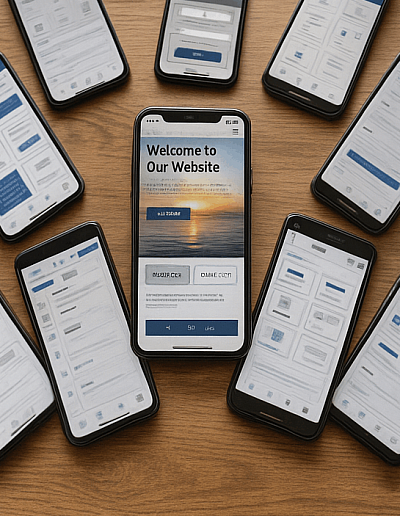Our Testing Process
Finding a website builder that meets your needs can be challenging.
Finding a website builder that meets your needs can be challenging.
At SimDif, we spent hours testing the top website-building apps available on the App Store and Play Store.
We had 2 goals:
Firstly, to understand the competitive landscape of phone-based website builders so that we can improve our own platform for our users.
Secondly, not to promote our own tool, but to help you choose the right site builder by providing insightful reviews of each one, so you can find an app to effectively present your business, products and services online.
While we have our perspective, we’ve done our best to provide transparent reviews of the highest-ranked website builders apps.
Each review was conducted with authenticity and adherence to core principles.
With over 15 years of experience in the website-building industry, we recognize both our strengths and areas for improvement. This research helps us grow and understand our peers, while also providing you with an informative review of each app builder.
How We Select Website-Building Apps to Test
To identify the apps to test, we searched for "website builder" on the App Store and Play Store. The highest-ranking apps are generally the most popular and widely used. We believe a good website builder should make it easy for anyone, even a complete beginner, to create an effective website.
Our core test involves attempting to create a simple website in under two hours. We downloaded each app, took notes, captured screenshots, and approached the process from a user’s perspective to develop thorough, no-nonsense guides.
Note: The latest tests were completed and documented in February 2025. The availability of apps may change over time due to updates on the App Store and Play Store.
How We Test and Review Website-Building Apps
Before installing the apps, we prepared all website content. This included text, images, and other assets stored in a dedicated folder. This allowed us to quickly build a site in each app, ensuring a fair and efficient comparison.
Each app was installed on the latest Android and iPhone devices available. We then created a seven-page website for a local bakery, including:
- 1x Home Page
- 1-3 x Product/Service Pages
- 1x Access Map Page
- 1x About Us Page
- 1x Contact Page
Our goal was to evaluate how each app performs when building a typical small business website.
In order to achieve the best results from the tests, we followed a structured approach to ensure consistency across all tests:
- Build a complete website within 2 hours.
- Assess the usability and features during the website creation process.
- Publish the site and review the final output.
- Check website performance on different devices.
After publishing websites, we checked their appearance on multiple devices to ensure both mobile and desktop compatibility.
Our 7-Point Evaluation Criteria
We assessed each website builder app based on the following key factors:
1. Ease of Use & Clarity
- Is the interface intuitive and easy to navigate?
- Does the app provide helpful guidance and tutorials?
- Are there significant usability barriers for beginners?I
- Is the app stable and free from major bugs?
2. Features, Functionality & AI Capabilities
- Are core features (text, images, buttons) available?
- Are advanced features (e.g., e-commerce, forms, blogs) supported?
- Can the website be edited across multiple devices?
- Does the app include AI-powered tools for automation, recommendations, or content generation?
3. Design & Customization
- How many templates are available, and how flexible are they?
- Can users modify fonts, colors, and layouts?
- Does the preview accurately reflect the published site?
- How well does the website display on different devices?
4. Performance & Speed
- Does the app run smoothly?
- Are websites optimized for fast loading speeds?
- Does the platform offer automatic image compression?
- How does the published site perform in speed tests?
5. SEO Capabilities
- Can users optimize meta titles, descriptions, and URLs?
- Does the app support structured headings and mobile-friendly SEO?
- Are SEO tools comprehensive or restricted in free vs. paid plans?
- Is there any built-in guidance for improving site visibility in search engines?
6. Pricing & Value for Money
- Are pricing tiers transparent, and do they offer good value?
- Are there any hidden costs or limitations in the free plan?
- How does the cost compare to competitors?
- Does the free version include branding or ads?
7. Customer Support & Communication
- What support channels are available (chat, email, help center)?
- How responsive and useful is customer support?
- Are support options limited based on the user’s subscription tier?
Finally: Can users realistically complete a full website using the mobile app alone?
Conclusion
The best website builder for you depends on your needs, skills, and the type of site you want to create.
By testing each platform in a real-world scenario, we focused on usability, features, design, performance, SEO, AI, pricing, support, and user experience.
We regularly update our methodology to reflect changes and improvements in website-building technology.
Whether you're a beginner or an experienced user, we hope our research helps you choose the right tool for your website project.



